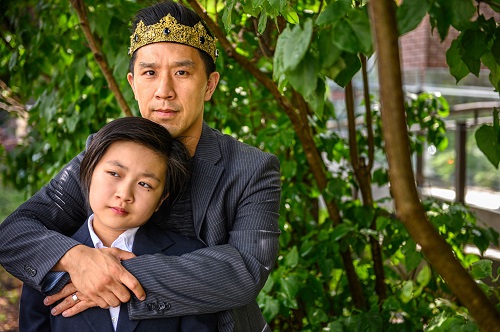
This outdoor adaptation of The Winter’s Tale – produced by Shakespeare in the Ruff – is playing at the bottom of a little hill in beautiful Withrow Park. It boasts a superlative cast, comedy with improv’s unpredictability, and monologues that will run your heart through the emotional gamut, then give it back refreshed for the real world.
The play tells of a king’s jealousy getting the best of him, how it leads him to lose his wife and children. And how finally, the universe conspires to grant him one final chance to atone for his paranoid, authoritarian ways.
Director, Dramaturg, and Choreographer, Sarah Kitz never let us slip into fairy tale comfort. Though brimming with laughs, family trauma is at the heart of The Winter’s Tale. It never quite dislodged enough from my short-term memory to let me believe everything was okay. She gets across how the play is Shakespeare’s tragedy masquerading as a comedy. She offers us a world where life can only have joy if there is sorrow to recognize itself against.
When Leontes, King of Sicily, gives in to paranoia and accuses his wife, Hermione, of being unfaithful with his best friend, Polixenes, King of Bohemia, he unwittingly sentences himself to a devastating fate. He doesn’t know that it will be 16 long years of shame and isolation before he gets to see his then-infant daughter, Perdita, again. She is betrothed to Polixenes’ son, Florizell, and they are giving the whole family thing one more go.
Kitz keeps her cast on point by emphasizing fundamentals. They project voices and exaggerate gestures, so the performance reaches the farthest row back. That way, passers-by crossing my line of sight were less likely to pull me out of the story.
Maddie Bautista’s music and lyrics combined with Kitz’s choreography are crowd-pleasers. This offsets the effort of parsing through the dialogue, which is delivered for the most part in its original Elizabethan English.
Richard Lee plays King Leontes and the son of the Old Shepherd who raises baby Perdita after she’s abandoned in the forest. Lee’s charisma and non-stop energy are a delight to behold. A gifted comic actor, he brings a “yes, and” mindset to the stage, completely open to anything unexpected that might happen in the open-air environment. At one point, as the Shepherd’s son, he accidentally nudges baby Perdita in her carrier. His split-second decision to apologize to her with a quick, “sorry, baby!”, sent a roar of laughter through the audience, filling us with excitement for what might come next.
On the dramatic side of things, Lee portrays Leontes’ jealousy with a hint of dictator’s delusion. It’s the kind you catch from living in an echo chamber of yes-men and from thinking your blood is godly. Leontes is captivating because he is unsteady. He believes any idea that pops into his head, supported by a heartbreaker of a monologue, unfettered and arresting in its intensity. As the play’s program proclaims, this is the 17th-century version of a telenovela.
Tiffany Martin plays Leontes’ wife, Hermione, as well as Autolycus, a Bohemian pickpocket who finds a heart when Florizell and Perdita need him most. Martin does so with the kind of gusto reserved for one’s most cherished activities. Every line is savoured, gifted to us as opposed to merely delivered. Highlights include Hermione’s final monologue and the scene where Autolycus imitates royalty. The first is an absolute showstopper. It is brash and eloquent and fearless in its vulnerability, all of it amplified by stage lights catching the tears streaming down her face. The second is an exaggeration, executed to perfection, that finds humour in but also questions how we carry ourselves according to how we want to be seen.
Eponine Lee plays Leontes’ son, Mamillius, with a sadness beyond her years. Her rendition of the bear that chases Leontes’ aid, Antigonus, off stage after he abandons baby Perdita in the forest is a mix of whimsy and terror that disarms with every growl. This is indeed the subject of Shakespeare’s most famous stage direction, “Exit, pursued by a bear.”
Jani Lauzon is exceptional as the Old Shepherd, Perdita’s adopted parent. She brings the slapstick every chance she gets, relishing the space to ham it up with a funny walk, or a triple take when something shocking happens. The warmth with which Lauzon shares the Shepherd’s hyperactivity made me feel like a kid at a birthday party with the best clown money could buy.
My guest, Ricky, found the actors’ commitment to the material incredibly engaging. It didn’t matter that people were walking their dogs or having picnics all around you. He also considered the pre-show land acknowledgement an effective way to both raise consciousness and get people in the mood to listen to poetic language.
The cast as a whole is the epitome of professionalism, staying loose with precision and intention as this classic story unfolds. There’s no recitation by rote to be had here, and little in the way of suspending disbelief. Toronto is no Sicily, but the performances fooled me. That each actor plays multiple characters only speaks higher of their skill.
A more than honourable final mention to the Guerrilla Ruff Squad, members of Shakespeare in the Ruff’s theatre creation apprenticeship program, for warming up the crowd before the show with ice cream and peanut butter themed Shakespeare improv. The evening would not have been nearly as enjoyable without them.
Details
- The Winter’s Tale is playing at Withrow Park (725 Logan Avenue) until September 2, 2019.
- Performances run Tuesday through Sunday at 7:30pm.
- Tickets range from $20 to $30 online and are Pay-What-You-Can in the park.
- In case of rain, performances will continue until no longer deemed safe, in which case, audience members will be given a voucher to come back on another night.
Photo of Richard Lee and Eponine Lee by Dahlia Katz.
